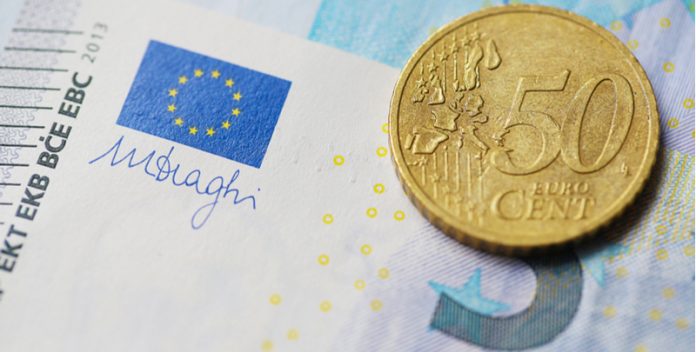More disappointment for pound traders sent sterling tumbling lower versus the euro on Wednesday. The pound euro exchange rate hit a low of €1.1466, pulling away from an 11 month high hit earlier in the week.
| What do these figures mean? |
|---|
|
When measuring the value of a pair of currencies, one set equals 1 unit and the other shows the current equivalent. As the market moves, the amount will vary from minute to minute. For example, it could be written: 1 GBP = 1.13990 EUR Here, £1 is equivalent to approximately €1.14. This specifically measures the pound’s worth against the euro. If the euro amount increases in this pairing, it’s positive for the pound. Or, if you were looking at it the other way around: 1 EUR = 0.87271 GBP In this example, €1 is equivalent to approximately £0.87. This measures the euro’s worth versus the British pound. If the sterling number gets larger, it’s good news for the euro. |
Analysts had been expecting U.K. inflation to have remained constant at 2.7% in March. Instead, inflation, as measured by the consumer price index (CPI) fell further to 2.5%. This is the second consecutive month that inflation has fallen, after climbing throughout 2017 before remaining elevated at 3% for the last quarter of the year. The pound fell more than the forecasted data over fears that the Bank of England (BoE) may not be so tempted to hike interest rates in May.
| Why do raised interest rates boost a currency’s value? |
|---|
| Interest rates are key to understanding exchange rate movements. Those who have large sums of money to invest want the highest return on their investments. Higher interest rate environments tend to offer higher yields. So, if the interest rate or at least the interest rate expectation of a country is relatively higher compared to another, then it attracts more foreign capital investment. Large corporations and investors need local currency to invest. More local currency used then boosts the demand of that currency, pushing the value higher. |
Today, investors will be turning towards retail sales which are forecast to have increased 1.4% in March, compared to the 1% in February. Pound traders have already been disappointed by wage data and inflation figures this week, so the big question is whether the disappointments will hit at hattrick? With consumers finally enjoying a wage rise in real terms there is a possibility that retail sales could beat analyst’s forecasts, which would send the pound higher.
Soft Eurozone Data Raises Doubts Over ECB’s Next Move
The publication of eurozone inflation data, which was weaker than analysts had been expecting, made little difference to euro traders. Inflation in the bloc was just 1.3% in March, missing the forecast by analysts of 1.4% on an annual basis. Inflation in the eurozone continues to be lacklustre, meaning that the European Central Bank (ECB) are unlikely to opt for a more aggressive stance on monetary policy. Furthermore, concerns that the bloc’s economy is also losing momentum is also supporting a more cautious ECB stance. Market participants are assuming that the ECB will not be looking to raise interest rates any time soon and this is keeping demand for the euro limited.
With no high impacting Eurozone data today, the pound could drive movements in the euro pound exchange rate. Euro traders will look towards inflation at factory gate level on Friday in the form of producer price index. A disappointment here could see the euro finish the week on a softer note.
|
This article was initially published on TransferWise.com from the same author. The content at Currency Live is the sole opinion of the authors and in no way reflects the views of TransferWise Inc. |





